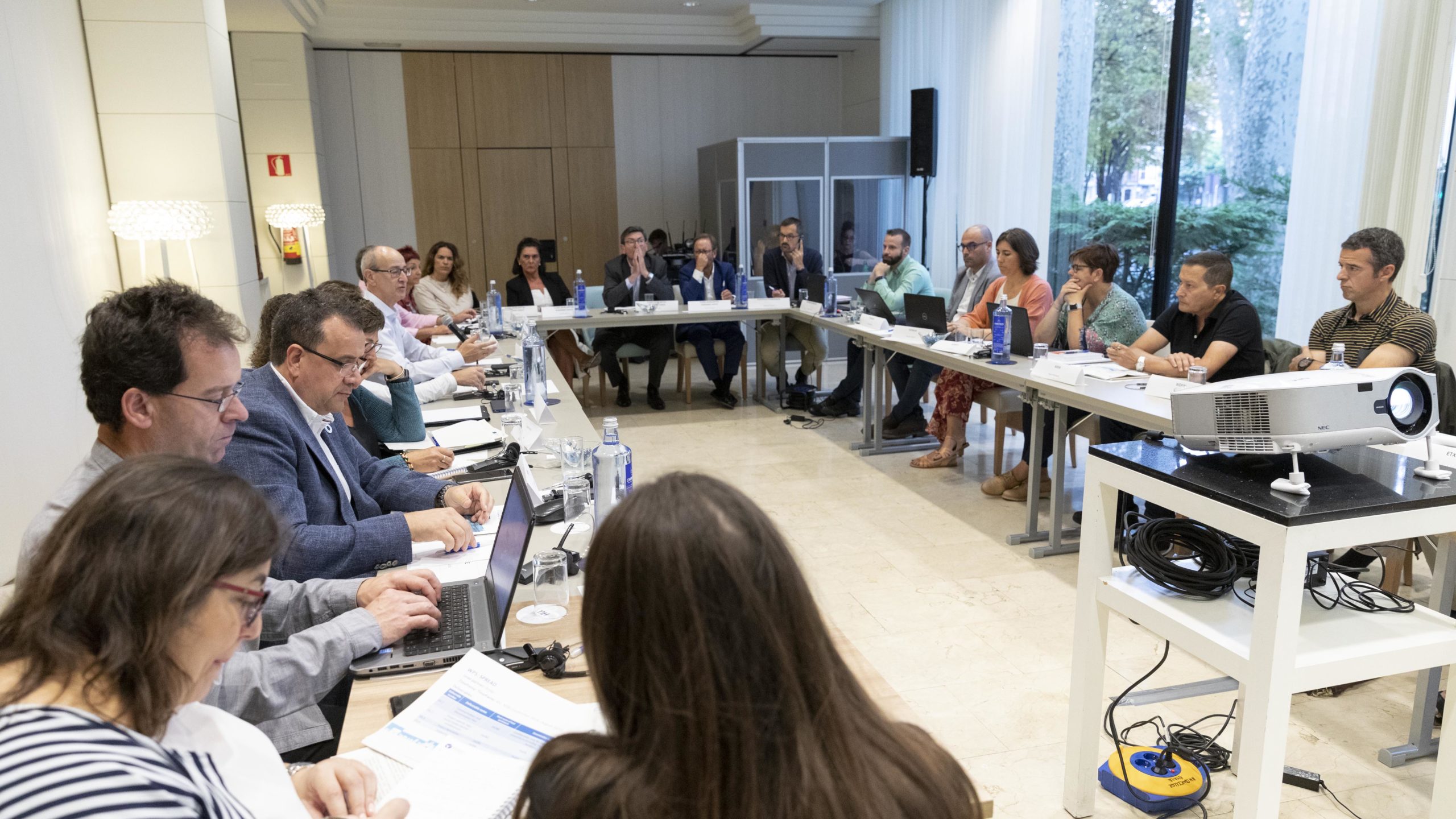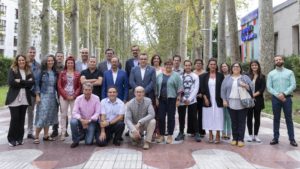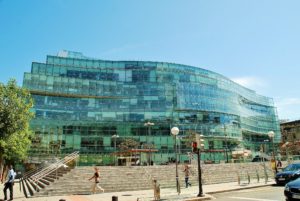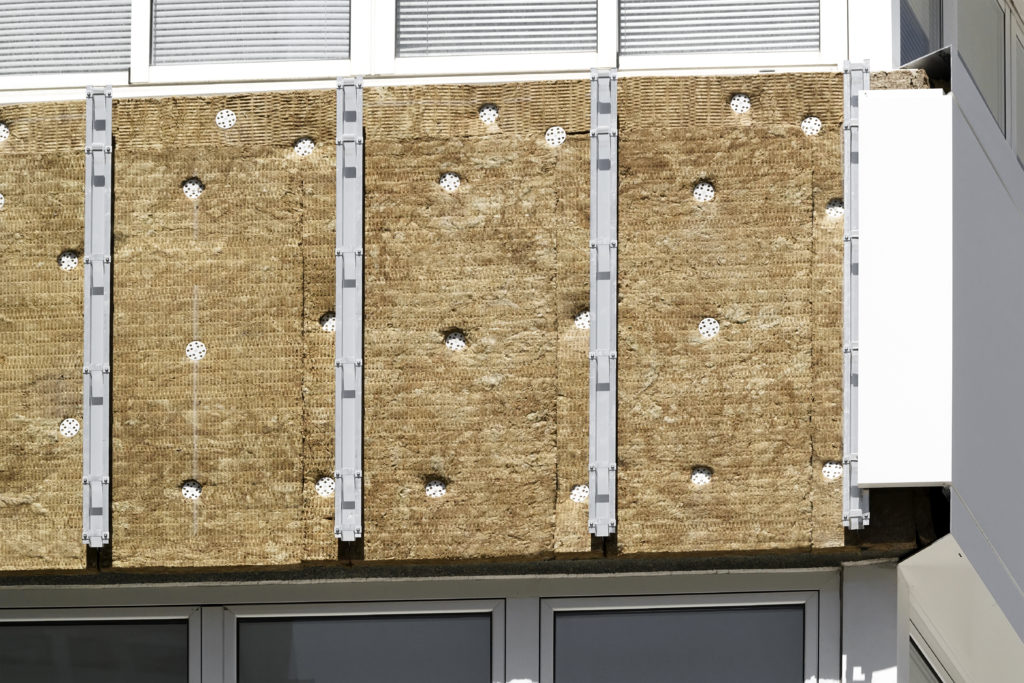
- September 5, 2019Vitoria hosts the first meeting of the European AGREE project
- November 6, 2019Selecting buildings for the project portfolio
- November 17, 2019Meeting with the banking sector and the AGREE project
- September 29, 2020Making contact with residents of the Agree project’s selected neighbourhoods
- November 18, 2020Start-up of the hotline service
- December 15, 2020Urban planning companies put the Agree preliminary studies and blueprints out to tender
Vitoria hosts the first meeting of the European AGREE project

The first meeting of the project, held on September 5, 2019 in Vitoria-Gasteiz, began with the introduction of the partners (Basque Government, Ensanche XXI, Etxegintza, Bidebi, Ihobe and Tecnalia) and the heads of the European Commission agency EASME for this project: Stephan Renner (Officer) and David Tallon (Financial Officer). Mario Yoldi (Basque Government) then gave a summary of the project, after pointing out that most buildings in the Basque Country have a rating of D or lower in terms of energy efficiency and that the aim is to set up new funding models for people who do not currently have access to such funding.
Carlos López (Basque Government) and David Mardaras (Tecnalia) dealt with the first work package of the project, WP1, reiterating that the contractual framework of the project is the Grant Agreement between EASME and the partners and the Consortium Agreement between the partners. Among other things, this first work package includes the presentation of a report on the technical and financial progress of the project every 18 months and another financial report of an internal nature every 9 months. For her part, Patricia Molina (Tecnalia) outlined the objectives of the second work package, WP2, with the selection of pilot buildings in each municipality and the preparation of an evaluation manual, in which Tecnalia will provide a database and develop a methodology and the town planning companies (Bidebi, Ensanche XXI and Etxegintza) will contact the municipalities’ social action departments.
The objectives of the third work package, WP3, were broken down by Carlos López (Basque Government) into three main areas: protocols for governance, management and communication; financial formulas and organisational formulas for aggregating demand. Next, David Tallon (Financial Officer of AGREE) outlined a Financial Guide for avoiding errors, with recommendations on subcontracting, personnel expenses, eligible and recognised expenses and financial disclosure statements. The outline of the fourth work package, WP4, presented by Patricia Molina (Tecnalia), considered the design of an action plan for the third month of the project, and its implementation with the respective actions related to communication, tendering and supporting neighbours in applying for aid.
The representatives of Ihobe, Marimar Alonso and Yolanda Rodríguez stressed the importance of communication as a core element in this project and offered Ihobe’s knowledge and experience in European networking and project communication. Last on the agenda was coordination with the Euskadi Opengela/Hiros4all urban regeneration project (neighbourhood offices to support the redevelopment processes as a one-stop shop), in order to launch an economically viable building renovation model that can be scaled up to other municipalities and replicated in other communities and that will be developed in two pilot neighbourhoods that are rated as being very vulnerable: Txonta y Otxarkoaga. The meeting concluded with the planning for the next six months, highlighting the importance of the presentation event in the three municipalities.
Selecting buildings for the project portfolio

On 6 November, Tecnalia, the Basque Government, Biebi, Etxegintza and Ensanche XXI met in Vitoria-Gasteiz to select building complexes for renovation, to compare results and check criteria, among them, an evaluation of the opportunity criteria.
During the meeting, the participants ranked the selection criteria. They agreed to prioritise vertical accessibility where necessary by installing lifts in the buildings, the state of repair, energy efficiency of building shells and facilities, as well as the human variables of the people who live in them, such as the percentage of elderly people, their income and the willingness of owners to upgrade the buildings. The scale also looks at the ratio of dwellings per lobby because a higher ratio of these will make it possible to finance the most expensive projects, installing lifts and performing other works.
Tecnalia presented plans for the short-listed of areas together with maps themed according to the needs of the buildings and the socio-economic profile of their residents.
The project partners decided that each municipal area can select two different neighbourhoods for rehabilitation projects under the Agree project, but that one of them must be assigned to the Agree pilot project and the other to the Follower project. Bidebi selected the Federico Mayo Group as the Agree pilot project in Basauri in the arrangement, with the possibility of other home owners associations in Hernán Cortés joining the scheme In Vitoria-Gasteiz, Ensanche XXI presented the Adurza neighbourhood as a pilot project and San Cristóbal, as a “follower”. In Donostia-San Sebastián, the initial selection is the Intxaurrondo neighbourhood, with San Roke as a second option.
Meeting with the banking sector and the AGREE project

Tecnalia, Bidebi, Etxegintza and Ensanche XXI, along with the Basque Government as the host, met with banks based in the Basque Country to explain the goals of the Horizon 2020 Agree project and the key role that the sector plays in fulfilling them.
During the work meeting held at the seat of the Basque Government in Vitoria-Gasteiz, in the format of a workshop on building renovation, Mario Yoldi, the Basque Government’s Director of Planning and Operational Resources, pointed out that the energy refurbishing of building has an economic dimension comparable to that of “new build”. Yoldi went over the details of the Housing Master Plan of the Basque Country, where one out of every five euros of the programme will be spent on refurbishing.
He also pointed out that the Basque Government will shortly have an assessment of last year’s work in that regard, where incentives led to over €500 million being invested in works. He went on to announce the government’s intention to unify all the current programmes into a single one. As regards financing, Yoldi provided an overview of the credit institutions’ current willingness to finance refurbishing projects by homeowners’ associations.
Making contact with residents of the Agree project’s selected neighbourhoods
The partners of the AGREE project held a meeting on 29 September to discuss how to address the impossibility of interacting face-to-face with the residents of buildings to be renovated because of restrictions imposed by the Covid-19 pandemic. Representatives of the Basque Government, Tecnalia, Bidebi-Basauri, Ensanche XXI, Donostia Etxegintza and Ihobe, a publicly-owned company of the Basque Government, all participated in the meeting.
Given that face-to-face contact is not permitted, they analysed other options that fulfil the objectives of the in-person interactions originally planned. A large number of people are affected, since the AGREE project covers a total of 3,208 homes, and 329 entrances, housing no less than 6,224 residents. Almost half of them, that is 3.077 people, reside in the Adurtza and San Cristobal neighbourhoods of Vitoria-Gasteiz; 2,208 live in Federico Mayo, in Basauri; and 1,119 have homes in the Donostiarra district of Intxaurrondo. Face-to-face meetings were to be held to explain the project, provide information about available grants and innovative financing mechanisms linked to the initiative, and to identify residents’ potential resistance and concerns regarding rehabilitation projects to improve the energy efficiency of their homes and buildings. It was also intended to involve these residents in the governance of future renovations from the outset, and to identify individuals able to drive action in their respective communities.
In the absence of face-to-face meetings, a number of alternative actions have been taken, such as preparing and delivering information materials, namely brochures adapted to the idiosyncrasies of the renovations sought in each municipal area, and a personalised letter, depending on the needs of each building to be upgraded. In addition to this letter, wherever necessary, a temporary helpline service has been proposed. The service would be free of charge and would provide general information on the project, building selection, grants and Basque Government subsidies, with particular attention to the financing mechanisms already operating – and those of Urban Rehabilitation Companies.
Start-up of the hotline service

Agree has set up a call center service that will assist and guide people with doubts and questions. The number that interested persons can call is 943413922.
Both the nature and scope of the project, as well as the support to the communities in the management of aid and the explanation of the financial tool designed for the project, generate questions that can be answered with this service.
Ensanche XXI, was able to present in a meeting to the neighborhoods last Thursday, October 29, with which the people of the three municipalities have access to the information of the project and can consult their doubts.
Urban planning companies put the Agree preliminary studies and blueprints out to tender

The urban planning companies in the Agree project have published the different specifications for the tendering of the preliminary studies and technical blueprint, to be carried out in this phase. Thus, Bidebi in Basauri, Ensanche XXI in Vitoria and Donostiako Etxegintza will make the different proposed solutions and an estimate of their costs available to the residents.
The Agree project seeks to improve the quality of life of the residents by means of energy savings and better accessibility, by boosting investment in the selected residential buildings.
Adurtza and San Cristóbal in Vitoria-Gasteiz; Federico Mayo in Basauri and a set of buildings in Los Luises, Gaztelu and Paseo Zarategi in Donostia-San Sebastián will foreseeably have the results of the tendered studies in spring 2021. They will thus be in a stronger position to embark on the rehabilitation of the thermal envelope of the buildings and their accessibility.
Full information on the different tendering processes is published on the Basque Country’s public procurement platform.
